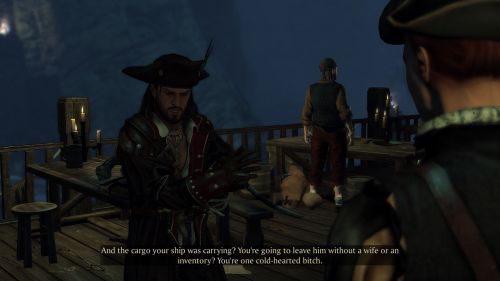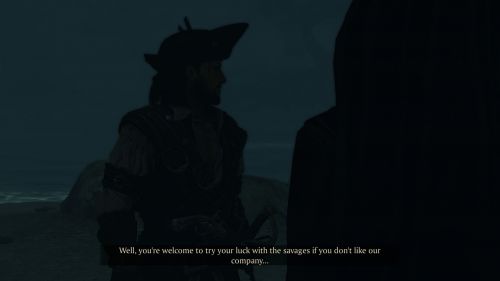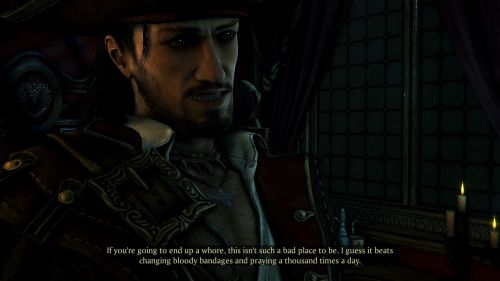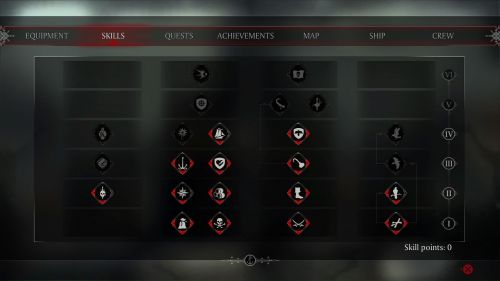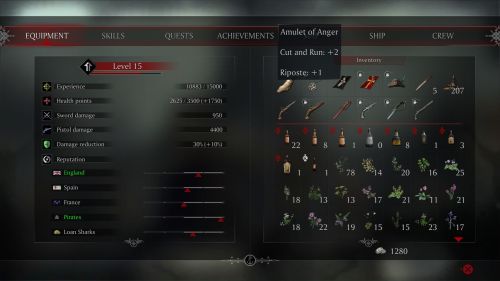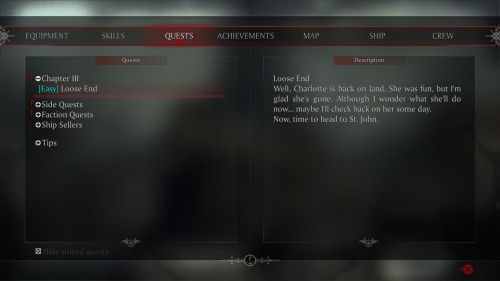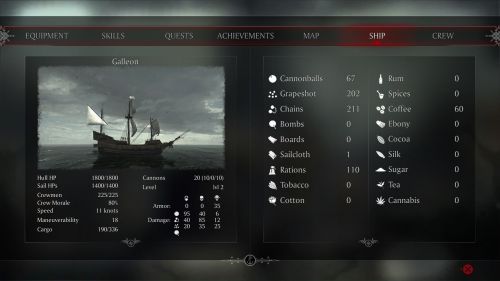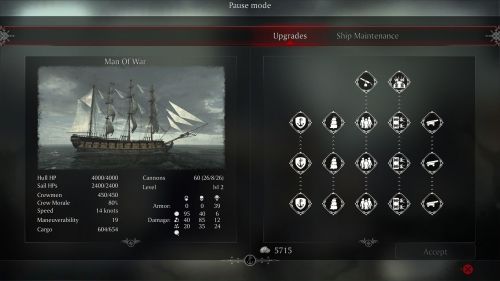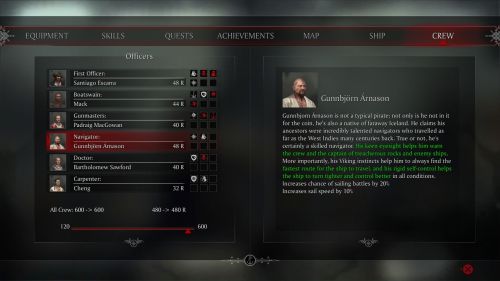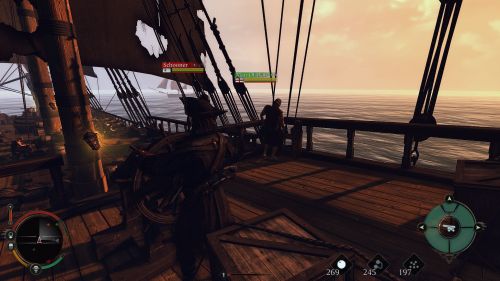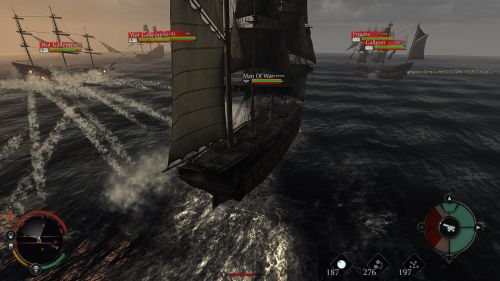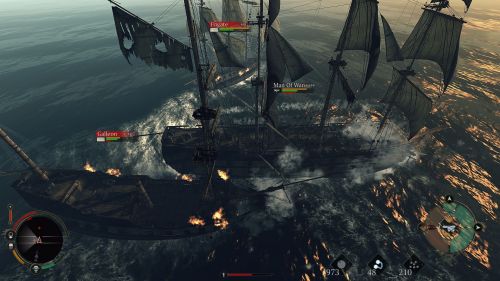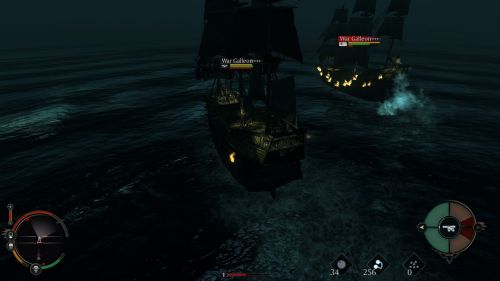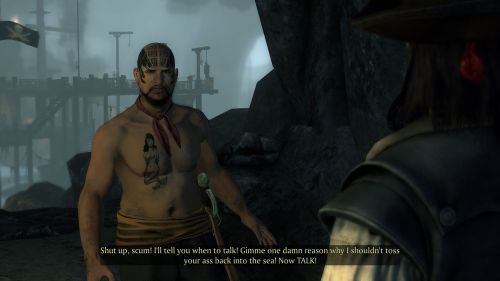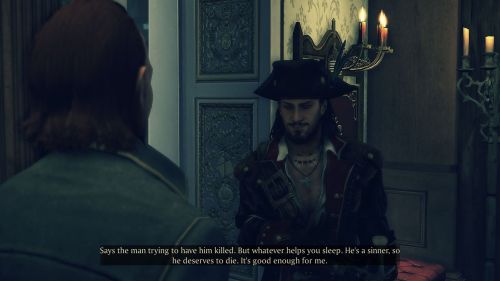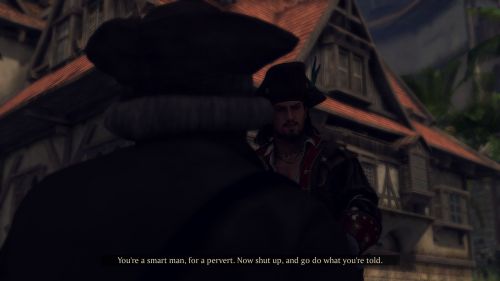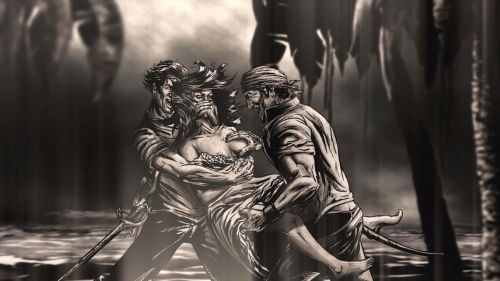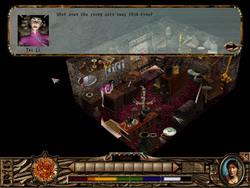RPG Codex Review: Vendetta - Curse of Raven's Cry
RPG Codex Review: Vendetta - Curse of Raven's Cry
Codex Review - posted by Infinitron on Sun 4 July 2021, 14:46:06
Tags: Reality Pump Studios; Vendetta - Curse of Raven's CryDuring the dark age of popamole, a German publisher by the name of TopWare Interactive and its Poland-based in-house development studio Reality Pump Studios managed to gain some renown for producing the Two Worlds games, a series of generic fantasy Oblivion clones. With the money earned making those, TopWare set out to create a title that seemed significantly more ambitious, a pirate action-RPG called Raven's Cry. First announced in 2011, the original developer of Raven's Cry was a now-defunct Finnish studio called Octane Games, a subsidiary of mobile developer Nitro Games. Apparently things did not go well there and in 2013 development was transferred to Reality Pump, who finally released the game in a disastrously unfinished state in early 2015. Faced with a predictably negative reception, Reality Pump would rerelease the game as Vendetta - Curse of Raven's Cry in late 2015 and continued to update it throughout 2017, but the damage had been done and it seemed doomed to be forgotten. Which it was, until its recent rediscovery by the esteemed Lord_Potato, our resident expert on obscure and forgotten RPGs. Is the updated and patched Raven's Cry an underrated gem? According to Lord_Potato, the answer is a qualified yes. The game's ship management and combat systems are certainly more extensive than I expected:
Read the full article: RPG Codex Review: Vendetta - Curse of Raven's Cry
Once you secure your first boat (and there are at least two ways to achieve that – one that makes you dependent on a certain faction and another that allows you to stay independent for a while longer) you can try your luck on the high seas. This is where the game truly shines: it offers true ship porn and lets you have lots of fun. You start with the most basic vessel: a schooner. It’s fast, agile, and can be crewed by a few dozen men. It allows travel between islands but has a weak hull, limited room for cargo, and only a few cannons. You will not do a lot of pirating with this one. Thankfully, when confronted by enemies at sea, the schooner can easily outrun them. However, you’ll soon want to find something larger and more dangerous. There are six types of vessels in Vendetta, ranging from small galleons and maneuverable frigates all the way to powerful man-o-wars and ships of the line. Each ship type has a number of stats: the hull and sails, speed, maneuverability, maximum crew, and cannons. These stats can be improved thanks to an upgrade tree with numerous enhancements, which are usually acquired at the expense of cargo space. Additional upgrades can be unlocked as a reward for quests for certain individuals and factions. The only limitation is that you can only have one ship. When you purchase a new one, the old one automatically gets sold (although you do get back some of the money you invested into upgrading it).
In order for a vessel to sail, it requires a crew – both regular sailors and officers. The former can be recruited in any settlement. The latter must be tracked down in various places ranging from taverns to jails. Some will join the crew for cash, others after completing certain quests. There are first officers, boatswains, gun masters, navigators, doctors, and carpenters. Officers come with numerous advantages: they can improve the aim of cannons and shorten reload times, conduct repairs without having to stop at a port, heal the wounded, or improve crew discipline which increases morale and lowers salary costs. However, some officers can also decrease your reputation or cause dissatisfaction among the crew. You can check their stats and biographies in the crew section of the menu. Officers add some character to your crew and allow for a bit of min-maxing. Your people also require food rations and salaries. The larger the crew, the more expensive each sea voyage becomes. Add to that the cost of ammunition and repairs and you get quite a serious list of expenditures.
How do you earn enough money to satisfy all these needs? There is a certain amount of gold to be claimed by completing quests and plundering ancient temples. But the only stable and reliable source of income is sea trade. You have your cargo hold, so use it! There are eleven categories of products that can be bought and sold, ranging from tobacco, rum and cannabis to ebony, sugar and silk. Each civilized island produces certain products and requires others. The rules of supply and demand will determine your trade routes throughout the Caribbean. However, keep in mind that the system is dynamic. If you sell too much rum to an island that wants it, you will flood the market and the prices will drop. Sometimes if you have full cargo of a certain product, it’s better to sell it in several colonies rather than just one in order to receive the best prices. If you try to buy too much of a certain product, its price will increase due to increased demand and lower supply. The system forces you to think and consider your options. When you have a quest objective on the other side of the map, you will most likely plan your journey so that you earn as much as possible before reaching your destination.
Of course, this is a pirate game, so you don’t have to pay for stuff: plundering ships on the high seas is also an attractive option. When sailing from one island to another, various random encounters will be offered to you – other ships or flotillas which will appear nearby – and you can choose to try your luck and engage them. Sometimes Christopher’s ship will be attacked by enemy vessels and then battle becomes inevitable, although it is possible to run away from tough fights if the wind is favourable and Raven’s vessel is fast enough. Sea battles are mandatory during certain quests (including the main quest), so it’s best to be prepared and keep a cargo hold with every possible type of ammunition.
Vendetta’s sea battles require some training and getting used to, but they’re even more enjoyable than their land-based counterparts. You maneuver your ship (taking into consideration the direction and strength of the wind), select an ammunition type and aim your cannons. By changing the angle by which the cannons are raised, you determine how far the cannonballs will fly. The game offers no visual aid to help you target enemy ships. You simply choose an angle, fire your cannons, evaluate the result and then adjust for better accuracy. Keep in mind however that ships are constantly on the move and the waves hitting them can make it more difficult to aim. Sometimes there are also weather impediments, such as a deep fog that limits visibility. This requires you to fire into the mist and look for explosions to see if the cannonballs hit.
Each ship has three HP bars – hull, sails, and crew. Accordingly, there are three types of ammo that target these bars – cannonballs which are best used against hulls (although they can destroy sails too), grapeshot which is used for killing crewmen, and chain shot which is the most effective at destroying sails. If the hull is breached, the ship simply sinks and you cannot plunder it. When sails and masts are destroyed, it is no longer able to maneuver, but may still fire when other ships pass by. If the crew is eliminated, the vessel will stop sailing and firing and basically become a ghost ship.
When nearby foes are defeated and only one enemy ship remains afloat, you may try to board it. It is a risky (an unsuccessful boarding means game over) but rewarding business. The surviving crew members will put up a fight and then the boarding mini-game begins. Surprisingly, unlike regular land and sea battles, it is turn-based. Christopher Raven does not personally board the enemy vessel but commands his men from afar. The choice is between engaging in melee combat and firing your cannons at point-blank range. After each turn the result is calculated (losses to both crews and destruction of both vessels). You then evaluate the situation and make another decision. Be careful – barraging an opponent’s hull at point blank might sink his ship, which means you won't get your hands on his precious cargo. If your foe has fewer men, a melee attack is usually the better course of action. After the enemy crew is butchered, you can decide what to plunder from the captured vessel (the size of your cargo hold is a limitation here). And when you’re done, you get to make one final decision whether to leave the ghost ship be or set it on fire.
Vendetta allows not just small sea duels but also larger clashes between several units or even flotillas from different factions. The largest battle I participated in during my playthrough pitched more than twenty vessels from England, France, and Spain against each other. Surviving such battles requires tactical thinking, careful positioning, and choosing one’s targets wisely. Positioning your ship between two enemies means trouble – your hull will be barraged from both sides with catastrophic results. You can try to use hostile ships to your advantage in a similar way by hiding from the volleys of more powerful foes behind them. All in all, Vendetta’s sea combat system can produce some very memorable and impressive fights. It may seem difficult and unnecessarily complicated at first, but once you understand and master it, you’ll have a great time pirating your way through the Caribbean.
In order for a vessel to sail, it requires a crew – both regular sailors and officers. The former can be recruited in any settlement. The latter must be tracked down in various places ranging from taverns to jails. Some will join the crew for cash, others after completing certain quests. There are first officers, boatswains, gun masters, navigators, doctors, and carpenters. Officers come with numerous advantages: they can improve the aim of cannons and shorten reload times, conduct repairs without having to stop at a port, heal the wounded, or improve crew discipline which increases morale and lowers salary costs. However, some officers can also decrease your reputation or cause dissatisfaction among the crew. You can check their stats and biographies in the crew section of the menu. Officers add some character to your crew and allow for a bit of min-maxing. Your people also require food rations and salaries. The larger the crew, the more expensive each sea voyage becomes. Add to that the cost of ammunition and repairs and you get quite a serious list of expenditures.
How do you earn enough money to satisfy all these needs? There is a certain amount of gold to be claimed by completing quests and plundering ancient temples. But the only stable and reliable source of income is sea trade. You have your cargo hold, so use it! There are eleven categories of products that can be bought and sold, ranging from tobacco, rum and cannabis to ebony, sugar and silk. Each civilized island produces certain products and requires others. The rules of supply and demand will determine your trade routes throughout the Caribbean. However, keep in mind that the system is dynamic. If you sell too much rum to an island that wants it, you will flood the market and the prices will drop. Sometimes if you have full cargo of a certain product, it’s better to sell it in several colonies rather than just one in order to receive the best prices. If you try to buy too much of a certain product, its price will increase due to increased demand and lower supply. The system forces you to think and consider your options. When you have a quest objective on the other side of the map, you will most likely plan your journey so that you earn as much as possible before reaching your destination.
Of course, this is a pirate game, so you don’t have to pay for stuff: plundering ships on the high seas is also an attractive option. When sailing from one island to another, various random encounters will be offered to you – other ships or flotillas which will appear nearby – and you can choose to try your luck and engage them. Sometimes Christopher’s ship will be attacked by enemy vessels and then battle becomes inevitable, although it is possible to run away from tough fights if the wind is favourable and Raven’s vessel is fast enough. Sea battles are mandatory during certain quests (including the main quest), so it’s best to be prepared and keep a cargo hold with every possible type of ammunition.
Vendetta’s sea battles require some training and getting used to, but they’re even more enjoyable than their land-based counterparts. You maneuver your ship (taking into consideration the direction and strength of the wind), select an ammunition type and aim your cannons. By changing the angle by which the cannons are raised, you determine how far the cannonballs will fly. The game offers no visual aid to help you target enemy ships. You simply choose an angle, fire your cannons, evaluate the result and then adjust for better accuracy. Keep in mind however that ships are constantly on the move and the waves hitting them can make it more difficult to aim. Sometimes there are also weather impediments, such as a deep fog that limits visibility. This requires you to fire into the mist and look for explosions to see if the cannonballs hit.
Each ship has three HP bars – hull, sails, and crew. Accordingly, there are three types of ammo that target these bars – cannonballs which are best used against hulls (although they can destroy sails too), grapeshot which is used for killing crewmen, and chain shot which is the most effective at destroying sails. If the hull is breached, the ship simply sinks and you cannot plunder it. When sails and masts are destroyed, it is no longer able to maneuver, but may still fire when other ships pass by. If the crew is eliminated, the vessel will stop sailing and firing and basically become a ghost ship.
When nearby foes are defeated and only one enemy ship remains afloat, you may try to board it. It is a risky (an unsuccessful boarding means game over) but rewarding business. The surviving crew members will put up a fight and then the boarding mini-game begins. Surprisingly, unlike regular land and sea battles, it is turn-based. Christopher Raven does not personally board the enemy vessel but commands his men from afar. The choice is between engaging in melee combat and firing your cannons at point-blank range. After each turn the result is calculated (losses to both crews and destruction of both vessels). You then evaluate the situation and make another decision. Be careful – barraging an opponent’s hull at point blank might sink his ship, which means you won't get your hands on his precious cargo. If your foe has fewer men, a melee attack is usually the better course of action. After the enemy crew is butchered, you can decide what to plunder from the captured vessel (the size of your cargo hold is a limitation here). And when you’re done, you get to make one final decision whether to leave the ghost ship be or set it on fire.
Vendetta allows not just small sea duels but also larger clashes between several units or even flotillas from different factions. The largest battle I participated in during my playthrough pitched more than twenty vessels from England, France, and Spain against each other. Surviving such battles requires tactical thinking, careful positioning, and choosing one’s targets wisely. Positioning your ship between two enemies means trouble – your hull will be barraged from both sides with catastrophic results. You can try to use hostile ships to your advantage in a similar way by hiding from the volleys of more powerful foes behind them. All in all, Vendetta’s sea combat system can produce some very memorable and impressive fights. It may seem difficult and unnecessarily complicated at first, but once you understand and master it, you’ll have a great time pirating your way through the Caribbean.
Read the full article: RPG Codex Review: Vendetta - Curse of Raven's Cry
[Review by Lord_Potato]
Before we begin, I have an admission to make: I have a soft spot for the underdogs. Furthermore, I value ambition over craftsmanship. When it comes to gaming, I prefer indies and medium-budget titles over AAA blockbusters. While not as visually attractive and polished, they often contain novel ideas which cannot be found in more expensive productions due to being considered too risky. They also tend to be less sanitized than the AAAs, which are often burdened down by the sheer weight of political correctness. When developers don’t have tens of millions of dollars on the line, they can allow themselves to be more courageous. Their game does not have to appeal to as wide an audience as possible, so there is no need to ‘streamline’ it into complete and utter brainlessness.
I’d like to thank another member of RPG Codex, Konjad, for bringing Vendetta: Curse of Raven’s Cry to my attention. Most of what I’d previously heard about the game in articles and on YouTube was very negative. It was supposed to be an unfinished, bug-ridden mess with a broken combat system, a poor excuse for a story, an unlikeable main character, and edgy dialogue. Furthermore, its publisher TopWare had been accused of dishonest practices such as posting fake reviews on Steam, which might be the reason the game was removed from the platform for a certain period of time. However, Konjad’s very enthusiastic opinions about Vendetta inspired my curiosity and motivated me to give it an honest try. Fortunately, the game had since returned to Steam after its mysterious disappearance, where I was able to purchase it with a 75% discount during a sale.
Without further ado, let’s jump in and find out whether the game’s bad reputation is justified or whether it truly is an underappreciated gem that deserves more attention. I hope my review will provide some answers to these questions.
Ahoy, Me Hearties!
Vendetta: Curse of Raven’s Cry (originally known simply as Raven’s Cry before being re-released with some serious bug fixes) is a 2015 pirate action-RPG set in the Caribbean during the Golden Age of Piracy. You play as a predetermined character – Captain Christopher Raven, a man with a tragic backstory. When he was a child, his entire family was murdered by a band of pirates led by the bloodthirsty Captain Neville. Christopher himself was spared, but not before Neville cut off his left hand. Bleeding to death, he was saved by an escaped black slave by the name of Marcus. Marcus took the crippled youth to an outlaw settlement in Saint Lucia where he raised him as his own. Ironically, while Christopher’s life was ruined by pirates, he became one of them when he reached adulthood: the fearsome Raven. He replaced his lost limb with a vicious hook and took to the high seas.
During the prologue, Christopher Raven is already a force to be reckoned with: in possession of a serious ship and an experienced crew, conducting missions for a wealthy Spanish employer. However he will soon be betrayed and lose it all, everything except his very life. Forced to start from scratch, he finds a new aim in his otherwise aimless existence: revenge. Christopher finds proof that Neville, who had mysteriously disappeared from the Caribbean, is back for more carnage, and it’s up to the young captain to stop him. First however he needs to become stronger. In true RPG fashion, once the introductory phase of the game ends, you start with nothing: no ship, no crew, few friends, basic equipment, and of course, a low experience level. If you are to deal with the most dreaded pirate in the Western Seas, you’ll have to do better. You can gain some experience and loot by completing quests on Saint Lucia, but your most important task is to acquire a ship. Thus begins the story of Christopher Raven – and your adventure.
Cleave Him to the Brisket!
Vendetta can be divided into two distinct parts: sailing the seas and exploring various landmasses (mostly islands, but also parts of South America in what is now Venezuela). The game world is vast: there are about a dozen settlements of decent size with wilderness regions surrounding each, and numerous treasure islands with dense tropical forests and ancient temples protected by indigenous tribes. I found the amount and variety of content satisfying, and during the forty hour campaign I never felt bored. The game introduces you to its numerous systems and then uses them to provide interesting and diverse gameplay.
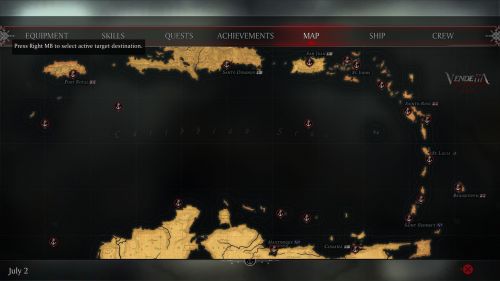
The world map, where you plan your voyages
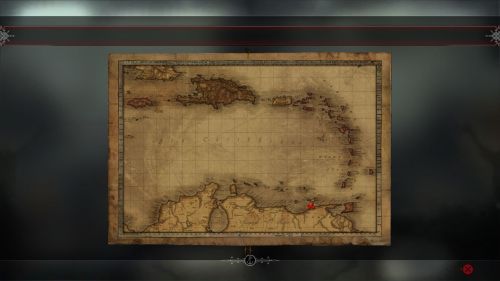
And here is a more traditional map of the region, with a mysterious X pointing to a treasure or some other mystery
When on land, Vendetta is a third-person RPG reminiscent of The Witcher 2. You observe the world from over Christopher’s shoulder. He’s an able fellow who can run, jump, walk silently, climb steep walls, traverse narrow bridges, and pull himself up from the edges of precipices. He’s no Lara Croft, but he usually manages to get everywhere you want him to go. When he levels up, you get to choose an ability from one of various skill trees focused on combat, ships, or his raven. Yes, Raven is accompanied by the bird from which he took his title. Once trained, it can actually do some really useful things, like steal objects from NPCs, attack enemies, or distract them so that Christopher can sneak by unseen. There is also a separate ‘general utility’ skill tree that governs things like gambling or brewing potions and preparing balms. However, these skills only improve when the story allows it. I must say that the character system is not very well balanced – there are too few skills or alternatively too many points to invest in them. If you play diligently and complete most quests in the game, by the end you will be able to max out almost everything, so there is not much space to create your own ‘builds’.
During his journeys Raven will often encounter opposition, and if he cannot talk his way out of trouble there will be violence. Combat is an element of Vendetta’s gameplay that was criticized by reviewers and players alike as a clunky, unresponsive mess. However, with the animation and balance fixes that were introduced in one of the patches, I actually found it fast, intuitive, and most importantly, fun. The basics are quite familiar: you have quick and strong melee attacks, a reflex-based block, and a dodge move. You can lock on a single enemy or choose to fight without locking, which is useful when facing numerous adversaries. There is also a terror bar, which works similarly to adrenaline in The Witcher 2. The terror bar fills up during fights. When it is full, our hero can execute a special attack that usually kills lesser enemies and seriously damages bosses. Similar to the Gothic series, Christopher does not start the game as a great fighter. His sabre attacks are clumsy and he often blocks too slowly to stop enemy attacks. However, once you invest a decent number of points into his melee skill tree, things begin to improve. First, everything starts to work more smoothly and the character becomes more responsive. He also receives some new moves and tricks. A more effective block and parry. A kick that can push enemies away. A hook attack that can drag them closer. A distracting raven attack which can open up foes to deadly slashes. Christopher's terror bar also increases more rapidly, allowing him to execute more special attacks.
That’s not all, either. Apart from his trusty sabre, Raven can also fight with pistols, which have several interesting mechanics. First, they’re really strong, dealing four or five times as much damage as melee weapons. However, you can only fire a pistol once before needing to reload, which is almost impossible to do in the middle of combat. Fortunately, you can carry up to three pistols on your person. Just remember to keep them loaded when going into battle. While using pistols, you need to mind the distance between Christopher and the enemy. If he shoots from too far away, he may miss. But if he shoots from too close a range, his opponent will simply grab the gun and push it away, wasting a precious bullet. Furthermore, you can’t fire a pistol if your powder gets wet, so there will be no shooting during rain. I have to say that Vendetta offers probably the best implementation of early firearms in any RPG that I’ve played. They’re very satisfying to use and are quite lethal, but they have so many caveats and limitations that they never become overpowered.
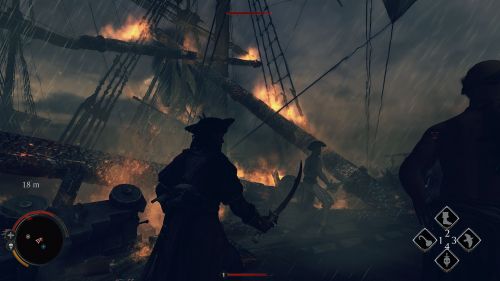
Fighting pirates, the scourge of the seven seas
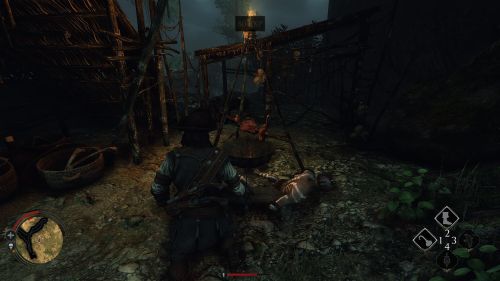
Massacring the indigenous population of the Caribbean
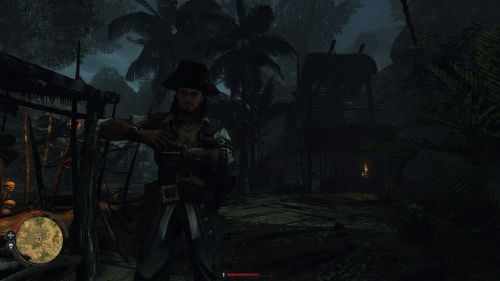
Reloading pistols with just one hand can be tricky, but Christopher is a resourceful lad
The enemy variety in Vendetta is limited, but that is somewhat understandable. After all, this is a historical RPG and you will not encounter any fantastic creatures. There are beasts in the wilderness – wolves, boars, jaguars, and even crocodiles. Apart from that, you will mostly face human foes – the indigenous tribes of the Caribbean islands, other pirates, and soldiers of the colonial powers. These can provide a decent challenge, especially in large numbers – and Christopher is usually outnumbered. Despite commanding a crew of hundreds, he is rarely aided by them on land and has to do everything himself (with the exception of certain parts of the main quest, when they move their lazy asses to shore and help Christopher during larger battles). There are also a few boss encounters, although these aren't terribly difficult except perhaps the last one.
Overall, the various options you are provided with make Vendetta’s combat interesting. It requires some skill and getting used to, but if you decide to push through the clunky beginning, combat becomes a pleasurable and rewarding experience.
Raise the Jolly Roger!
Once you secure your first boat (and there are at least two ways to achieve that – one that makes you dependent on a certain faction and another that allows you to stay independent for a while longer) you can try your luck on the high seas. This is where the game truly shines: it offers true ship porn and lets you have lots of fun. You start with the most basic vessel: a schooner. It’s fast, agile, and can be crewed by a few dozen men. It allows travel between islands but has a weak hull, limited room for cargo, and only a few cannons. You will not do a lot of pirating with this one. Thankfully, when confronted by enemies at sea, the schooner can easily outrun them. However, you’ll soon want to find something larger and more dangerous. There are six types of vessels in Vendetta, ranging from small galleons and maneuverable frigates all the way to powerful man-o-wars and ships of the line. Each ship type has a number of stats: the hull and sails, speed, maneuverability, maximum crew, and cannons. These stats can be improved thanks to an upgrade tree with numerous enhancements, which are usually acquired at the expense of cargo space. Additional upgrades can be unlocked as a reward for quests for certain individuals and factions. The only limitation is that you can only have one ship. When you purchase a new one, the old one automatically gets sold (although you do get back some of the money you invested into upgrading it).
In order for a vessel to sail, it requires a crew – both regular sailors and officers. The former can be recruited in any settlement. The latter must be tracked down in various places ranging from taverns to jails. Some will join the crew for cash, others after completing certain quests. There are first officers, boatswains, gun masters, navigators, doctors, and carpenters. Officers come with numerous advantages: they can improve the aim of cannons and shorten reload times, conduct repairs without having to stop at a port, heal the wounded, or improve crew discipline which increases morale and lowers salary costs. However, some officers can also decrease your reputation or cause dissatisfaction among the crew. You can check their stats and biographies in the crew section of the menu. Officers add some character to your crew and allow for a bit of min-maxing. Your people also require food rations and salaries. The larger the crew, the more expensive each sea voyage becomes. Add to that the cost of ammunition and repairs and you get quite a serious list of expenditures.
How do you earn enough money to satisfy all these needs? There is a certain amount of gold to be claimed by completing quests and plundering ancient temples. But the only stable and reliable source of income is sea trade. You have your cargo hold, so use it! There are eleven categories of products that can be bought and sold, ranging from tobacco, rum and cannabis to ebony, sugar and silk. Each civilized island produces certain products and requires others. The rules of supply and demand will determine your trade routes throughout the Caribbean. However, keep in mind that the system is dynamic. If you sell too much rum to an island that wants it, you will flood the market and the prices will drop. Sometimes if you have full cargo of a certain product, it’s better to sell it in several colonies rather than just one in order to receive the best prices. If you try to buy too much of a certain product, its price will increase due to increased demand and lower supply. The system forces you to think and consider your options. When you have a quest objective on the other side of the map, you will most likely plan your journey so that you earn as much as possible before reaching your destination.
Of course, this is a pirate game, so you don’t have to pay for stuff: plundering ships on the high seas is also an attractive option. When sailing from one island to another, various random encounters will be offered to you – other ships or flotillas which will appear nearby – and you can choose to try your luck and engage them. Sometimes Christopher’s ship will be attacked by enemy vessels and then battle becomes inevitable, although it is possible to run away from tough fights if the wind is favourable and Raven’s vessel is fast enough. Sea battles are mandatory during certain quests (including the main quest), so it’s best to be prepared and keep a cargo hold with every possible type of ammunition.
Vendetta’s sea battles require some training and getting used to, but they’re even more enjoyable than their land-based counterparts. You maneuver your ship (taking into consideration the direction and strength of the wind), select an ammunition type and aim your cannons. By changing the angle by which the cannons are raised, you determine how far the cannonballs will fly. The game offers no visual aid to help you target enemy ships. You simply choose an angle, fire your cannons, evaluate the result and then adjust for better accuracy. Keep in mind however that ships are constantly on the move and the waves hitting them can make it more difficult to aim. Sometimes there are also weather impediments, such as a deep fog that limits visibility. This requires you to fire into the mist and look for explosions to see if the cannonballs hit.
Each ship has three HP bars – hull, sails, and crew. Accordingly, there are three types of ammo that target these bars – cannonballs which are best used against hulls (although they can destroy sails too), grapeshot which is used for killing crewmen, and chain shot which is the most effective at destroying sails. If the hull is breached, the ship simply sinks and you cannot plunder it. When sails and masts are destroyed, it is no longer able to maneuver, but may still fire when other ships pass by. If the crew is eliminated, the vessel will stop sailing and firing and basically become a ghost ship.
When nearby foes are defeated and only one enemy ship remains afloat, you may try to board it. It is a risky (an unsuccessful boarding means game over) but rewarding business. The surviving crew members will put up a fight and then the boarding mini-game begins. Surprisingly, unlike regular land and sea battles, it is turn-based. Christopher Raven does not personally board the enemy vessel but commands his men from afar. The choice is between engaging in melee combat and firing your cannons at point-blank range. After each turn the result is calculated (losses to both crews and destruction of both vessels). You then evaluate the situation and make another decision. Be careful – barraging an opponent’s hull at point blank might sink his ship, which means you won't get your hands on his precious cargo. If your foe has fewer men, a melee attack is usually the better course of action. After the enemy crew is butchered, you can decide what to plunder from the captured vessel (the size of your cargo hold is a limitation here). And when you’re done, you get to make one final decision whether to leave the ghost ship be or set it on fire.
Vendetta allows not just small sea duels but also larger clashes between several units or even flotillas from different factions. The largest battle I participated in during my playthrough pitched more than twenty vessels from England, France, and Spain against each other. Surviving such battles requires tactical thinking, careful positioning, and choosing one’s targets wisely. Positioning your ship between two enemies means trouble – your hull will be barraged from both sides with catastrophic results. You can try to use hostile ships to your advantage in a similar way by hiding from the volleys of more powerful foes behind them. All in all, Vendetta’s sea combat system can produce some very memorable and impressive fights. It may seem difficult and unnecessarily complicated at first, but once you understand and master it, you’ll have a great time pirating your way through the Caribbean.
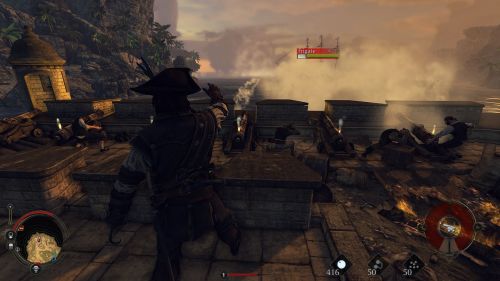
The game even supports mixed sea and land battles. Here Raven commands the defense of a fort against a naval invasion. Later he'll butcher the landing party
All Hands Hoy!
Fighting, sailing, plundering, and trading are only part of the fun. These are activities that require context, which is provided by quests. Of these Vendetta: Curse of Raven’s Cry has plenty. Not only is the main questline quite robust (perhaps too robust, especially in the late game), but there is also a wide selection of side activities (which become available gradually over the course of the game, so that you don’t complete them all at once like in Gothic). Over the course of his journey, Christopher Raven might hear rumors of Spanish treasure ships carrying loot plundered from South America, which he can intercept. He’ll find clues that lead him to islands with hidden treasure. And of course, he’ll find employment with various individuals, usually of ill repute, and do shady work for them. As his fame grows new possibilities will open up, allowing him to work for the game’s major factions. Most islands in the Caribbean belong to one of the great powers: the British, French, and Spanish colonial empires. There are also pirate settlements and the hidden base of a secret faction which I will not spoil here. Finally, there are certain factions (namely moneylenders) without settlements, who still manage to exert an influence over events in the world.
Your relationship with the factions is an important part of the campaign. You can improve relations by completing quests for colonial governors or local loan sharks, but can also spoil them quite easily by sinking the faction’s ships or killing their agents. Certain quests will force you to make a choice about who to ally with and that usually carries a certain cost. When you piss off a faction, its settlements will become hostile. You will notice that when you visit them, your ship stops entering the main harbour, but rather drops anchor in a quiet bay on the other side of the island. The prices of merchandise in such towns will increase, making trade unprofitable and forcing you to adjust your trade routes. Even worse, Christopher will be attacked on sight by the soldiers of the colonial garrisons, who can be rather tough. When a quest leads you into a hostile settlement, it is best to take a stealthy approach. However, if you no longer care about relations with a certain faction, you can try and go in with guns blazing. Just save your game before you do it - the colonial infantry does not screw around. During sea voyages, you can actually disguise yourself as a member of a faction by flying their flag from your mast. This system is used in several quests in which you require a certain flag in order to be admitted into a location or conduct false flag attacks.
The game offers a satisfying variety of quests. There are the typical kill and fetch quests of course, but also more interesting missions such as helping a rogue escape the law, forcing gamblers to pay off their debts, testing a new type of pistol for an inventor, protecting diplomatic envoys, gathering blackmail material against high colonial officials, or saving Christian missionaries from cannibal tribes. One of the most interesting questlines is connected to the Bridgeport brothel managed by Christopher’s friend and/or ex-lover, Maria. Over the course of the adventure she will ask for Raven’s help in various matters, ranging from tracking down escaped prostitutes to fighting off the competition. Vendetta’s quests can often be solved in several different ways. Sometimes they involve moral dilemmas, although in Raven’s world the options usually range from bad to worse.
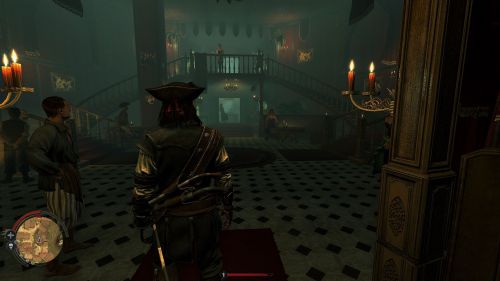
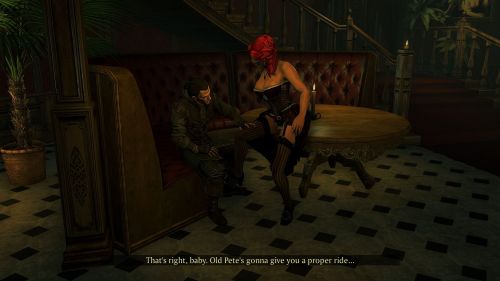
No good pirate RPG is complete without a visit to the brothel...
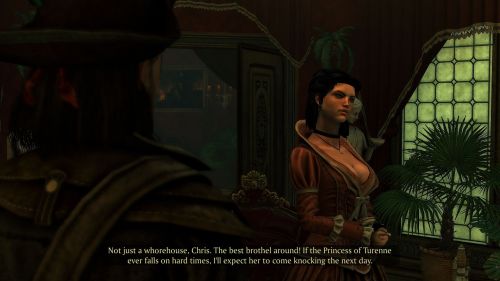
...where you’ll receive quests from the madam.
That’s because Vendetta’s vision of the world is extremely misanthropic. The pirates are not presented as romantic swashbucklers as in Risen 2 and 3. They are coldblooded killers motivated by avarice, lust, and violent urges. The representatives of the law-abiding colonial governments are not much better. The ruling classes are corrupt, treacherous, and full of contempt for the lower strata of society. The simple folk are all too eager to condemn those who they consider beneath them such as slaves, maroons, and prostitutes. There is very little decency to be found in the Caribbean, and even those few characters that appear genuinely good at first will inevitably reveal their true colors. Nor is Captain Raven the last righteous man in Sodom. On the contrary, he’s just like everybody else and fully aware of it. During his quest for revenge he will hurt people all the time, and not just the guilty ones that deserve it. For example, Charlotte, a Catholic nun he saves from cannibals, only to send her down the path to ignominy.
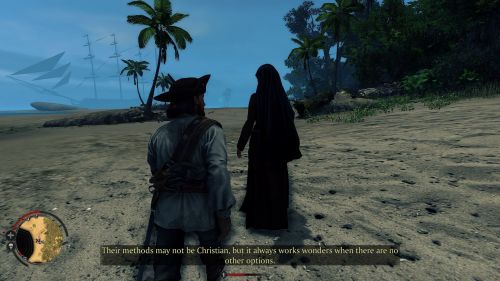
Seriously, what other game allows you to romance a Catholic nun...
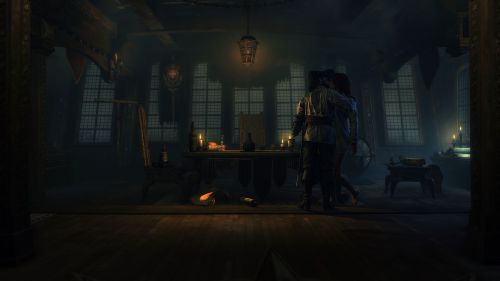
...and then turn her...
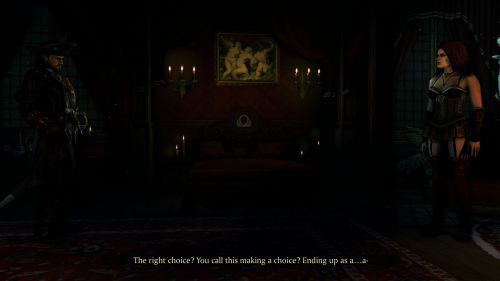
...into something else entirely?
At first, it’s an approach that seems refreshing. Christopher is a true anti-hero in a world of assholes. Like the anti-westerns that sought to question the traditional values of the western film genre, Vendetta often seems like an anti-pirate game that wants to show the truth behind the myths of the Golden Age of Piracy. However, all this wickedness without a moment of respite eventually becomes tiresome. Over the course of the adventure, Christopher will frequently be approached by NPCs who wish to make a deal with him. They want to sell him something, offer a tour of an island, or in the case of a certain priest, simply to receive his confession and grant him absolution. This is almost always a scam. If you fall for it, Raven will end up at best without his purse or at worst murdered in some ditch. If you accept one of these offers out of curiosity, always keep your finger over the ‘draw weapon’ button.
Vendetta’s misanthropic worldview and its dedication to historical fidelity was another reason for the criticism it received from the press. In their typical simplistic manner, journalists claimed that the game was ‘racist, homophobic and misogynistic’. I don’t think that’s a correct assessment, but being a representation of a certain age in history, the game does allow you to experience those prejudices. Christopher Raven is not a racist himself – after all, he was raised by a black man – but he will not call out those who express contempt towards black people. You will not see dialogue options that feel like they were taken straight from the 21st century in Vendetta. While Raven has a history of cavorting with prostitutes, he does not treat them with much respect, something which is obvious from both his words and actions. As for the subject of homosexuality, there is a certain mission in which he will use the boyloving proclivities of a certain official as leverage to force certain concessions. When conversing with said official, Raven will openly call him a pervert. However, that does not mean the developers of the game were homophobic themselves. They simply allowed their character to be a man of his time and age, a subtlety that is easy to miss for the game journalists of our age.
Blow me down!
Before reaching the conclusion of this already overlong review, I should say a few things about the game’s audio-visual presentation, its user interface and certain technical deficiencies it suffers from.
Vendetta: Curse of Raven’s Cry was not an AAA production. Its budget was obviously limited compared to games like Assassin’s Creed: Black Flag (another pirate adventure that enjoyed much more favorable reviews from the press) or The Witcher 3 (which was released the same year). Despite this fact, Vendetta’s graphics can often impress, especially when it comes to environments. The game’s towns are believably vast, their streets and marketplaces properly filled with dozens of NPCs who look rather decent (at least from a distance). Tropical forests are dark, atmospheric, and thick with vegetation. The day and night cycle along with changing weather conditions can produce truly beautiful visual effects. Encounters at sea are particularly impressive, with each ship lovingly recreated from historical source materials. During battles, damage inflicted by cannonballs and collisions will be visible on hulls and masts.
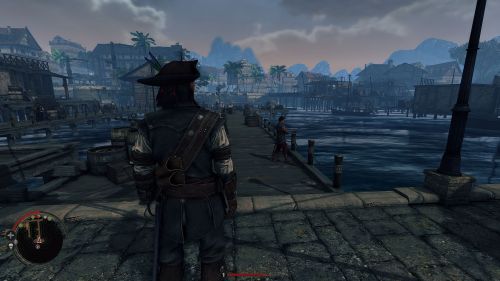

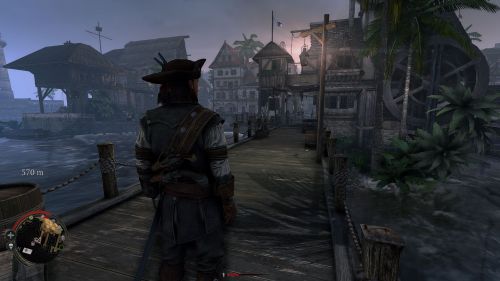
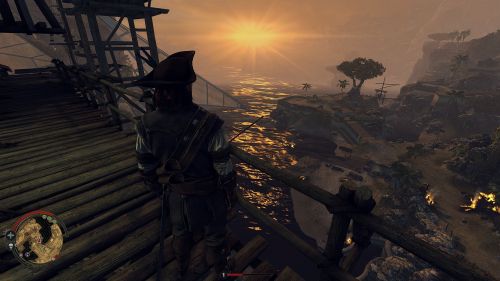
Despite its low quality textures, Vendetta often looks pretty...
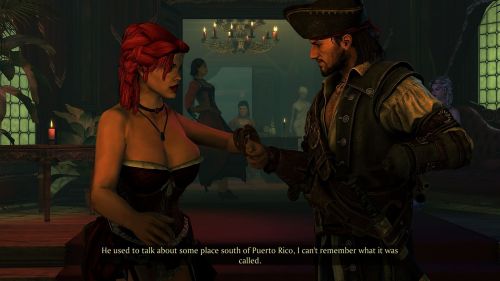
...although the female characters could use some work.
On the other hand, the graphical fidelity of the game’s characters (particularly female ones) is somewhat lacking and they have a rather limited range of facial expressions (for example, Christopher’s face seems like it can only express anger, rage, or being pissed off). However, even here there are some details that are worthy of praise. For example, Raven’s appearance will change depending on his health. When wounded, his face will become covered with bruises, and his clothes stained with blood. Unfortunately, for some reason the game’s cutscenes were not rendered in-engine and their visual quality is lower than that of the game itself. Another strange choice is the presentation of occasional flashbacks from Raven’s tragic past. They are presented as scenes from a black and white comic book. The drawings are decent enough and fit the gloomy atmosphere of the game, but I’m not sure if they’re a match for its visual style.
Composed by Victor Stoyanov, Vendetta’s soundtrack is filled with tracks suitable for a pirate adventure, some of them bombastic and epic, others mysterious or melancholic. There were moments when its violin strums reminded me of the hypnotic music of Arcanum. Naturally, the game also includes plenty of sea shanties. You’ll hear them while visiting taverns, or sometimes being performed on the streets for a small crowd of listeners. They add much to the game’s atmosphere and are a pure joy to listen to (although perhaps a bit repetitive – the game could have used more of them). The voice acting on the other hand is far from perfect. Sometimes a voice won’t fit a character, or will just be badly recorded, too quiet or difficult to understand.
The game’s user interface is clean and functional, with separate menus for character building, inventory, quest journal, map, ship management and crew status. However, there are two glaring oversights. First, the ‘interact’ and ‘jump’ actions use the same key. Even though you can change the control setup, it is impossible to assign them to different keys. This was frequently irritating. Often when I tried to pick up some plant or speak to an NPC, Christopher would jump instead, looking like a complete idiot. The other omission is even worse and frankly I’m stunned that it was not fixed after the extensive patching. When buying or selling products (a large and important part of the game), there is no slider that allows you to select the exact quantity you want. You can either buy one or ten units of merchandise. You want to buy 85 units of rum? Well too bad, you’ll have to click thirteen times to do that. You want to sell 73 units of silk and 65 units of spices? That’ll be at least 21 clicks, thank you.
At release the game (then still known as Raven’s Cry) was nigh unplayable due to bugs. This was the primary reason for its extremely poor reception (with a Metacritic score of 27/100). Since then it’s been patched, rereleased under a new name, and patched some more. The last update was released in 2017 and not only fixed many bugs but also improved the latter parts of the main quest. This is the version I played, and I must say that despite years of patching, Vendetta still has numerous bugs. The first guy I attacked in the game (some random dude in a tavern, just to see if I could initiate combat with strangers) melted into the wall, never to be seen again. The soldiers I battled against in the first area often lost focus and just walked in front of me in circles, forgetting to fight and allowing me to slaughter them easily with my sabre. The same thing happened with the Ogre, one of the more supposedly badass enemies in Saint Lucia, thus granting me an easy victory. From time to time I encountered a bug where Christopher would leave a building and the moment the exterior location loaded, he would become immobile. Fortunately, waiting a bit seemed to help and he usually regained his mobility. Sometimes I also had to save and reload. On several occasions the world map became white, making it impossible to travel between islands. Restarting the game was the only way to get rid of this problem. Sometimes dialogue seemed unusually stilted, making me suspect that parts of it were missing. There were also missing cutscenes and numerous graphical glitches.
Once when visiting the British port of Sainte-Rose, I experienced a bug unlike any other. My ship, anchored at the harbor, was being fired upon as if during a battle on the open sea. I could hear artillery barrages and explosions. Fires appeared on the ship’s deck and its hull integrity suffered continuous damage, forcing me to keep visiting the local carpenter to order repairs. For some time I thought this was a feature – that some pirates from whom I had previously fled before entering the port had decided to put up a chase and then attacked me again. However, after I left the harbor this never happened again and I realized it was a bug, perhaps the phantom of a feature that had been cut from the game but was not completely removed. Regrettably, I’ve been unable to reproduce this strange event since.
Weigh Anchor and Hoist the Mizzen!
Vendetta: Curse of Raven’s Cry is a game with a very troubled history. Passed from one studio to the other, it was released prematurely without being tested properly. The bugs made the game difficult to play and easy to hate. Its complete disregard for the current political climate strengthened the negative reception it received from the press. The alleged shady practices of its publisher proved to be the last nail in the game’s coffin.
That’s a pity, because I found Vendetta to be a fascinating RPG that does a lot of things well in spite of its many bugs and imperfections. The game offers an interesting and dark world to discover, good writing with lots of delicious vulgarity, ingenious quests, memorable battles, and a dynamic economy. Its character system might not be the greatest out there, but the ship management makes up for it.
In summary, Vendetta is an ambitious title that tries to provide the complete pirate experience without compromising or cutting corners. Its creators obviously poured much love into it, spending years fixing its problems after its release. I recommend that every RPG lover give the game a try and I sincerely hope you enjoy Christopher Raven’s adventures as much as I did. If you’re spooked by the bugs, keep in mind that the game is regularly on sale. For the $7 I paid for it, it’s basically a steal.
Before we begin, I have an admission to make: I have a soft spot for the underdogs. Furthermore, I value ambition over craftsmanship. When it comes to gaming, I prefer indies and medium-budget titles over AAA blockbusters. While not as visually attractive and polished, they often contain novel ideas which cannot be found in more expensive productions due to being considered too risky. They also tend to be less sanitized than the AAAs, which are often burdened down by the sheer weight of political correctness. When developers don’t have tens of millions of dollars on the line, they can allow themselves to be more courageous. Their game does not have to appeal to as wide an audience as possible, so there is no need to ‘streamline’ it into complete and utter brainlessness.
I’d like to thank another member of RPG Codex, Konjad, for bringing Vendetta: Curse of Raven’s Cry to my attention. Most of what I’d previously heard about the game in articles and on YouTube was very negative. It was supposed to be an unfinished, bug-ridden mess with a broken combat system, a poor excuse for a story, an unlikeable main character, and edgy dialogue. Furthermore, its publisher TopWare had been accused of dishonest practices such as posting fake reviews on Steam, which might be the reason the game was removed from the platform for a certain period of time. However, Konjad’s very enthusiastic opinions about Vendetta inspired my curiosity and motivated me to give it an honest try. Fortunately, the game had since returned to Steam after its mysterious disappearance, where I was able to purchase it with a 75% discount during a sale.
Without further ado, let’s jump in and find out whether the game’s bad reputation is justified or whether it truly is an underappreciated gem that deserves more attention. I hope my review will provide some answers to these questions.
Ahoy, Me Hearties!
Vendetta: Curse of Raven’s Cry (originally known simply as Raven’s Cry before being re-released with some serious bug fixes) is a 2015 pirate action-RPG set in the Caribbean during the Golden Age of Piracy. You play as a predetermined character – Captain Christopher Raven, a man with a tragic backstory. When he was a child, his entire family was murdered by a band of pirates led by the bloodthirsty Captain Neville. Christopher himself was spared, but not before Neville cut off his left hand. Bleeding to death, he was saved by an escaped black slave by the name of Marcus. Marcus took the crippled youth to an outlaw settlement in Saint Lucia where he raised him as his own. Ironically, while Christopher’s life was ruined by pirates, he became one of them when he reached adulthood: the fearsome Raven. He replaced his lost limb with a vicious hook and took to the high seas.
During the prologue, Christopher Raven is already a force to be reckoned with: in possession of a serious ship and an experienced crew, conducting missions for a wealthy Spanish employer. However he will soon be betrayed and lose it all, everything except his very life. Forced to start from scratch, he finds a new aim in his otherwise aimless existence: revenge. Christopher finds proof that Neville, who had mysteriously disappeared from the Caribbean, is back for more carnage, and it’s up to the young captain to stop him. First however he needs to become stronger. In true RPG fashion, once the introductory phase of the game ends, you start with nothing: no ship, no crew, few friends, basic equipment, and of course, a low experience level. If you are to deal with the most dreaded pirate in the Western Seas, you’ll have to do better. You can gain some experience and loot by completing quests on Saint Lucia, but your most important task is to acquire a ship. Thus begins the story of Christopher Raven – and your adventure.
Cleave Him to the Brisket!
Vendetta can be divided into two distinct parts: sailing the seas and exploring various landmasses (mostly islands, but also parts of South America in what is now Venezuela). The game world is vast: there are about a dozen settlements of decent size with wilderness regions surrounding each, and numerous treasure islands with dense tropical forests and ancient temples protected by indigenous tribes. I found the amount and variety of content satisfying, and during the forty hour campaign I never felt bored. The game introduces you to its numerous systems and then uses them to provide interesting and diverse gameplay.

The world map, where you plan your voyages

And here is a more traditional map of the region, with a mysterious X pointing to a treasure or some other mystery
When on land, Vendetta is a third-person RPG reminiscent of The Witcher 2. You observe the world from over Christopher’s shoulder. He’s an able fellow who can run, jump, walk silently, climb steep walls, traverse narrow bridges, and pull himself up from the edges of precipices. He’s no Lara Croft, but he usually manages to get everywhere you want him to go. When he levels up, you get to choose an ability from one of various skill trees focused on combat, ships, or his raven. Yes, Raven is accompanied by the bird from which he took his title. Once trained, it can actually do some really useful things, like steal objects from NPCs, attack enemies, or distract them so that Christopher can sneak by unseen. There is also a separate ‘general utility’ skill tree that governs things like gambling or brewing potions and preparing balms. However, these skills only improve when the story allows it. I must say that the character system is not very well balanced – there are too few skills or alternatively too many points to invest in them. If you play diligently and complete most quests in the game, by the end you will be able to max out almost everything, so there is not much space to create your own ‘builds’.
During his journeys Raven will often encounter opposition, and if he cannot talk his way out of trouble there will be violence. Combat is an element of Vendetta’s gameplay that was criticized by reviewers and players alike as a clunky, unresponsive mess. However, with the animation and balance fixes that were introduced in one of the patches, I actually found it fast, intuitive, and most importantly, fun. The basics are quite familiar: you have quick and strong melee attacks, a reflex-based block, and a dodge move. You can lock on a single enemy or choose to fight without locking, which is useful when facing numerous adversaries. There is also a terror bar, which works similarly to adrenaline in The Witcher 2. The terror bar fills up during fights. When it is full, our hero can execute a special attack that usually kills lesser enemies and seriously damages bosses. Similar to the Gothic series, Christopher does not start the game as a great fighter. His sabre attacks are clumsy and he often blocks too slowly to stop enemy attacks. However, once you invest a decent number of points into his melee skill tree, things begin to improve. First, everything starts to work more smoothly and the character becomes more responsive. He also receives some new moves and tricks. A more effective block and parry. A kick that can push enemies away. A hook attack that can drag them closer. A distracting raven attack which can open up foes to deadly slashes. Christopher's terror bar also increases more rapidly, allowing him to execute more special attacks.
That’s not all, either. Apart from his trusty sabre, Raven can also fight with pistols, which have several interesting mechanics. First, they’re really strong, dealing four or five times as much damage as melee weapons. However, you can only fire a pistol once before needing to reload, which is almost impossible to do in the middle of combat. Fortunately, you can carry up to three pistols on your person. Just remember to keep them loaded when going into battle. While using pistols, you need to mind the distance between Christopher and the enemy. If he shoots from too far away, he may miss. But if he shoots from too close a range, his opponent will simply grab the gun and push it away, wasting a precious bullet. Furthermore, you can’t fire a pistol if your powder gets wet, so there will be no shooting during rain. I have to say that Vendetta offers probably the best implementation of early firearms in any RPG that I’ve played. They’re very satisfying to use and are quite lethal, but they have so many caveats and limitations that they never become overpowered.

Fighting pirates, the scourge of the seven seas

Massacring the indigenous population of the Caribbean

Reloading pistols with just one hand can be tricky, but Christopher is a resourceful lad
The enemy variety in Vendetta is limited, but that is somewhat understandable. After all, this is a historical RPG and you will not encounter any fantastic creatures. There are beasts in the wilderness – wolves, boars, jaguars, and even crocodiles. Apart from that, you will mostly face human foes – the indigenous tribes of the Caribbean islands, other pirates, and soldiers of the colonial powers. These can provide a decent challenge, especially in large numbers – and Christopher is usually outnumbered. Despite commanding a crew of hundreds, he is rarely aided by them on land and has to do everything himself (with the exception of certain parts of the main quest, when they move their lazy asses to shore and help Christopher during larger battles). There are also a few boss encounters, although these aren't terribly difficult except perhaps the last one.
Overall, the various options you are provided with make Vendetta’s combat interesting. It requires some skill and getting used to, but if you decide to push through the clunky beginning, combat becomes a pleasurable and rewarding experience.
Raise the Jolly Roger!
Once you secure your first boat (and there are at least two ways to achieve that – one that makes you dependent on a certain faction and another that allows you to stay independent for a while longer) you can try your luck on the high seas. This is where the game truly shines: it offers true ship porn and lets you have lots of fun. You start with the most basic vessel: a schooner. It’s fast, agile, and can be crewed by a few dozen men. It allows travel between islands but has a weak hull, limited room for cargo, and only a few cannons. You will not do a lot of pirating with this one. Thankfully, when confronted by enemies at sea, the schooner can easily outrun them. However, you’ll soon want to find something larger and more dangerous. There are six types of vessels in Vendetta, ranging from small galleons and maneuverable frigates all the way to powerful man-o-wars and ships of the line. Each ship type has a number of stats: the hull and sails, speed, maneuverability, maximum crew, and cannons. These stats can be improved thanks to an upgrade tree with numerous enhancements, which are usually acquired at the expense of cargo space. Additional upgrades can be unlocked as a reward for quests for certain individuals and factions. The only limitation is that you can only have one ship. When you purchase a new one, the old one automatically gets sold (although you do get back some of the money you invested into upgrading it).
In order for a vessel to sail, it requires a crew – both regular sailors and officers. The former can be recruited in any settlement. The latter must be tracked down in various places ranging from taverns to jails. Some will join the crew for cash, others after completing certain quests. There are first officers, boatswains, gun masters, navigators, doctors, and carpenters. Officers come with numerous advantages: they can improve the aim of cannons and shorten reload times, conduct repairs without having to stop at a port, heal the wounded, or improve crew discipline which increases morale and lowers salary costs. However, some officers can also decrease your reputation or cause dissatisfaction among the crew. You can check their stats and biographies in the crew section of the menu. Officers add some character to your crew and allow for a bit of min-maxing. Your people also require food rations and salaries. The larger the crew, the more expensive each sea voyage becomes. Add to that the cost of ammunition and repairs and you get quite a serious list of expenditures.
How do you earn enough money to satisfy all these needs? There is a certain amount of gold to be claimed by completing quests and plundering ancient temples. But the only stable and reliable source of income is sea trade. You have your cargo hold, so use it! There are eleven categories of products that can be bought and sold, ranging from tobacco, rum and cannabis to ebony, sugar and silk. Each civilized island produces certain products and requires others. The rules of supply and demand will determine your trade routes throughout the Caribbean. However, keep in mind that the system is dynamic. If you sell too much rum to an island that wants it, you will flood the market and the prices will drop. Sometimes if you have full cargo of a certain product, it’s better to sell it in several colonies rather than just one in order to receive the best prices. If you try to buy too much of a certain product, its price will increase due to increased demand and lower supply. The system forces you to think and consider your options. When you have a quest objective on the other side of the map, you will most likely plan your journey so that you earn as much as possible before reaching your destination.
Of course, this is a pirate game, so you don’t have to pay for stuff: plundering ships on the high seas is also an attractive option. When sailing from one island to another, various random encounters will be offered to you – other ships or flotillas which will appear nearby – and you can choose to try your luck and engage them. Sometimes Christopher’s ship will be attacked by enemy vessels and then battle becomes inevitable, although it is possible to run away from tough fights if the wind is favourable and Raven’s vessel is fast enough. Sea battles are mandatory during certain quests (including the main quest), so it’s best to be prepared and keep a cargo hold with every possible type of ammunition.
Vendetta’s sea battles require some training and getting used to, but they’re even more enjoyable than their land-based counterparts. You maneuver your ship (taking into consideration the direction and strength of the wind), select an ammunition type and aim your cannons. By changing the angle by which the cannons are raised, you determine how far the cannonballs will fly. The game offers no visual aid to help you target enemy ships. You simply choose an angle, fire your cannons, evaluate the result and then adjust for better accuracy. Keep in mind however that ships are constantly on the move and the waves hitting them can make it more difficult to aim. Sometimes there are also weather impediments, such as a deep fog that limits visibility. This requires you to fire into the mist and look for explosions to see if the cannonballs hit.
Each ship has three HP bars – hull, sails, and crew. Accordingly, there are three types of ammo that target these bars – cannonballs which are best used against hulls (although they can destroy sails too), grapeshot which is used for killing crewmen, and chain shot which is the most effective at destroying sails. If the hull is breached, the ship simply sinks and you cannot plunder it. When sails and masts are destroyed, it is no longer able to maneuver, but may still fire when other ships pass by. If the crew is eliminated, the vessel will stop sailing and firing and basically become a ghost ship.
When nearby foes are defeated and only one enemy ship remains afloat, you may try to board it. It is a risky (an unsuccessful boarding means game over) but rewarding business. The surviving crew members will put up a fight and then the boarding mini-game begins. Surprisingly, unlike regular land and sea battles, it is turn-based. Christopher Raven does not personally board the enemy vessel but commands his men from afar. The choice is between engaging in melee combat and firing your cannons at point-blank range. After each turn the result is calculated (losses to both crews and destruction of both vessels). You then evaluate the situation and make another decision. Be careful – barraging an opponent’s hull at point blank might sink his ship, which means you won't get your hands on his precious cargo. If your foe has fewer men, a melee attack is usually the better course of action. After the enemy crew is butchered, you can decide what to plunder from the captured vessel (the size of your cargo hold is a limitation here). And when you’re done, you get to make one final decision whether to leave the ghost ship be or set it on fire.
Vendetta allows not just small sea duels but also larger clashes between several units or even flotillas from different factions. The largest battle I participated in during my playthrough pitched more than twenty vessels from England, France, and Spain against each other. Surviving such battles requires tactical thinking, careful positioning, and choosing one’s targets wisely. Positioning your ship between two enemies means trouble – your hull will be barraged from both sides with catastrophic results. You can try to use hostile ships to your advantage in a similar way by hiding from the volleys of more powerful foes behind them. All in all, Vendetta’s sea combat system can produce some very memorable and impressive fights. It may seem difficult and unnecessarily complicated at first, but once you understand and master it, you’ll have a great time pirating your way through the Caribbean.

The game even supports mixed sea and land battles. Here Raven commands the defense of a fort against a naval invasion. Later he'll butcher the landing party
All Hands Hoy!
Fighting, sailing, plundering, and trading are only part of the fun. These are activities that require context, which is provided by quests. Of these Vendetta: Curse of Raven’s Cry has plenty. Not only is the main questline quite robust (perhaps too robust, especially in the late game), but there is also a wide selection of side activities (which become available gradually over the course of the game, so that you don’t complete them all at once like in Gothic). Over the course of his journey, Christopher Raven might hear rumors of Spanish treasure ships carrying loot plundered from South America, which he can intercept. He’ll find clues that lead him to islands with hidden treasure. And of course, he’ll find employment with various individuals, usually of ill repute, and do shady work for them. As his fame grows new possibilities will open up, allowing him to work for the game’s major factions. Most islands in the Caribbean belong to one of the great powers: the British, French, and Spanish colonial empires. There are also pirate settlements and the hidden base of a secret faction which I will not spoil here. Finally, there are certain factions (namely moneylenders) without settlements, who still manage to exert an influence over events in the world.
Your relationship with the factions is an important part of the campaign. You can improve relations by completing quests for colonial governors or local loan sharks, but can also spoil them quite easily by sinking the faction’s ships or killing their agents. Certain quests will force you to make a choice about who to ally with and that usually carries a certain cost. When you piss off a faction, its settlements will become hostile. You will notice that when you visit them, your ship stops entering the main harbour, but rather drops anchor in a quiet bay on the other side of the island. The prices of merchandise in such towns will increase, making trade unprofitable and forcing you to adjust your trade routes. Even worse, Christopher will be attacked on sight by the soldiers of the colonial garrisons, who can be rather tough. When a quest leads you into a hostile settlement, it is best to take a stealthy approach. However, if you no longer care about relations with a certain faction, you can try and go in with guns blazing. Just save your game before you do it - the colonial infantry does not screw around. During sea voyages, you can actually disguise yourself as a member of a faction by flying their flag from your mast. This system is used in several quests in which you require a certain flag in order to be admitted into a location or conduct false flag attacks.
The game offers a satisfying variety of quests. There are the typical kill and fetch quests of course, but also more interesting missions such as helping a rogue escape the law, forcing gamblers to pay off their debts, testing a new type of pistol for an inventor, protecting diplomatic envoys, gathering blackmail material against high colonial officials, or saving Christian missionaries from cannibal tribes. One of the most interesting questlines is connected to the Bridgeport brothel managed by Christopher’s friend and/or ex-lover, Maria. Over the course of the adventure she will ask for Raven’s help in various matters, ranging from tracking down escaped prostitutes to fighting off the competition. Vendetta’s quests can often be solved in several different ways. Sometimes they involve moral dilemmas, although in Raven’s world the options usually range from bad to worse.


No good pirate RPG is complete without a visit to the brothel...

...where you’ll receive quests from the madam.
That’s because Vendetta’s vision of the world is extremely misanthropic. The pirates are not presented as romantic swashbucklers as in Risen 2 and 3. They are coldblooded killers motivated by avarice, lust, and violent urges. The representatives of the law-abiding colonial governments are not much better. The ruling classes are corrupt, treacherous, and full of contempt for the lower strata of society. The simple folk are all too eager to condemn those who they consider beneath them such as slaves, maroons, and prostitutes. There is very little decency to be found in the Caribbean, and even those few characters that appear genuinely good at first will inevitably reveal their true colors. Nor is Captain Raven the last righteous man in Sodom. On the contrary, he’s just like everybody else and fully aware of it. During his quest for revenge he will hurt people all the time, and not just the guilty ones that deserve it. For example, Charlotte, a Catholic nun he saves from cannibals, only to send her down the path to ignominy.

Seriously, what other game allows you to romance a Catholic nun...

...and then turn her...

...into something else entirely?
At first, it’s an approach that seems refreshing. Christopher is a true anti-hero in a world of assholes. Like the anti-westerns that sought to question the traditional values of the western film genre, Vendetta often seems like an anti-pirate game that wants to show the truth behind the myths of the Golden Age of Piracy. However, all this wickedness without a moment of respite eventually becomes tiresome. Over the course of the adventure, Christopher will frequently be approached by NPCs who wish to make a deal with him. They want to sell him something, offer a tour of an island, or in the case of a certain priest, simply to receive his confession and grant him absolution. This is almost always a scam. If you fall for it, Raven will end up at best without his purse or at worst murdered in some ditch. If you accept one of these offers out of curiosity, always keep your finger over the ‘draw weapon’ button.
Vendetta’s misanthropic worldview and its dedication to historical fidelity was another reason for the criticism it received from the press. In their typical simplistic manner, journalists claimed that the game was ‘racist, homophobic and misogynistic’. I don’t think that’s a correct assessment, but being a representation of a certain age in history, the game does allow you to experience those prejudices. Christopher Raven is not a racist himself – after all, he was raised by a black man – but he will not call out those who express contempt towards black people. You will not see dialogue options that feel like they were taken straight from the 21st century in Vendetta. While Raven has a history of cavorting with prostitutes, he does not treat them with much respect, something which is obvious from both his words and actions. As for the subject of homosexuality, there is a certain mission in which he will use the boyloving proclivities of a certain official as leverage to force certain concessions. When conversing with said official, Raven will openly call him a pervert. However, that does not mean the developers of the game were homophobic themselves. They simply allowed their character to be a man of his time and age, a subtlety that is easy to miss for the game journalists of our age.
Blow me down!
Before reaching the conclusion of this already overlong review, I should say a few things about the game’s audio-visual presentation, its user interface and certain technical deficiencies it suffers from.
Vendetta: Curse of Raven’s Cry was not an AAA production. Its budget was obviously limited compared to games like Assassin’s Creed: Black Flag (another pirate adventure that enjoyed much more favorable reviews from the press) or The Witcher 3 (which was released the same year). Despite this fact, Vendetta’s graphics can often impress, especially when it comes to environments. The game’s towns are believably vast, their streets and marketplaces properly filled with dozens of NPCs who look rather decent (at least from a distance). Tropical forests are dark, atmospheric, and thick with vegetation. The day and night cycle along with changing weather conditions can produce truly beautiful visual effects. Encounters at sea are particularly impressive, with each ship lovingly recreated from historical source materials. During battles, damage inflicted by cannonballs and collisions will be visible on hulls and masts.




Despite its low quality textures, Vendetta often looks pretty...

...although the female characters could use some work.
On the other hand, the graphical fidelity of the game’s characters (particularly female ones) is somewhat lacking and they have a rather limited range of facial expressions (for example, Christopher’s face seems like it can only express anger, rage, or being pissed off). However, even here there are some details that are worthy of praise. For example, Raven’s appearance will change depending on his health. When wounded, his face will become covered with bruises, and his clothes stained with blood. Unfortunately, for some reason the game’s cutscenes were not rendered in-engine and their visual quality is lower than that of the game itself. Another strange choice is the presentation of occasional flashbacks from Raven’s tragic past. They are presented as scenes from a black and white comic book. The drawings are decent enough and fit the gloomy atmosphere of the game, but I’m not sure if they’re a match for its visual style.
Composed by Victor Stoyanov, Vendetta’s soundtrack is filled with tracks suitable for a pirate adventure, some of them bombastic and epic, others mysterious or melancholic. There were moments when its violin strums reminded me of the hypnotic music of Arcanum. Naturally, the game also includes plenty of sea shanties. You’ll hear them while visiting taverns, or sometimes being performed on the streets for a small crowd of listeners. They add much to the game’s atmosphere and are a pure joy to listen to (although perhaps a bit repetitive – the game could have used more of them). The voice acting on the other hand is far from perfect. Sometimes a voice won’t fit a character, or will just be badly recorded, too quiet or difficult to understand.
The game’s user interface is clean and functional, with separate menus for character building, inventory, quest journal, map, ship management and crew status. However, there are two glaring oversights. First, the ‘interact’ and ‘jump’ actions use the same key. Even though you can change the control setup, it is impossible to assign them to different keys. This was frequently irritating. Often when I tried to pick up some plant or speak to an NPC, Christopher would jump instead, looking like a complete idiot. The other omission is even worse and frankly I’m stunned that it was not fixed after the extensive patching. When buying or selling products (a large and important part of the game), there is no slider that allows you to select the exact quantity you want. You can either buy one or ten units of merchandise. You want to buy 85 units of rum? Well too bad, you’ll have to click thirteen times to do that. You want to sell 73 units of silk and 65 units of spices? That’ll be at least 21 clicks, thank you.
At release the game (then still known as Raven’s Cry) was nigh unplayable due to bugs. This was the primary reason for its extremely poor reception (with a Metacritic score of 27/100). Since then it’s been patched, rereleased under a new name, and patched some more. The last update was released in 2017 and not only fixed many bugs but also improved the latter parts of the main quest. This is the version I played, and I must say that despite years of patching, Vendetta still has numerous bugs. The first guy I attacked in the game (some random dude in a tavern, just to see if I could initiate combat with strangers) melted into the wall, never to be seen again. The soldiers I battled against in the first area often lost focus and just walked in front of me in circles, forgetting to fight and allowing me to slaughter them easily with my sabre. The same thing happened with the Ogre, one of the more supposedly badass enemies in Saint Lucia, thus granting me an easy victory. From time to time I encountered a bug where Christopher would leave a building and the moment the exterior location loaded, he would become immobile. Fortunately, waiting a bit seemed to help and he usually regained his mobility. Sometimes I also had to save and reload. On several occasions the world map became white, making it impossible to travel between islands. Restarting the game was the only way to get rid of this problem. Sometimes dialogue seemed unusually stilted, making me suspect that parts of it were missing. There were also missing cutscenes and numerous graphical glitches.
Once when visiting the British port of Sainte-Rose, I experienced a bug unlike any other. My ship, anchored at the harbor, was being fired upon as if during a battle on the open sea. I could hear artillery barrages and explosions. Fires appeared on the ship’s deck and its hull integrity suffered continuous damage, forcing me to keep visiting the local carpenter to order repairs. For some time I thought this was a feature – that some pirates from whom I had previously fled before entering the port had decided to put up a chase and then attacked me again. However, after I left the harbor this never happened again and I realized it was a bug, perhaps the phantom of a feature that had been cut from the game but was not completely removed. Regrettably, I’ve been unable to reproduce this strange event since.
Weigh Anchor and Hoist the Mizzen!
Vendetta: Curse of Raven’s Cry is a game with a very troubled history. Passed from one studio to the other, it was released prematurely without being tested properly. The bugs made the game difficult to play and easy to hate. Its complete disregard for the current political climate strengthened the negative reception it received from the press. The alleged shady practices of its publisher proved to be the last nail in the game’s coffin.
That’s a pity, because I found Vendetta to be a fascinating RPG that does a lot of things well in spite of its many bugs and imperfections. The game offers an interesting and dark world to discover, good writing with lots of delicious vulgarity, ingenious quests, memorable battles, and a dynamic economy. Its character system might not be the greatest out there, but the ship management makes up for it.
In summary, Vendetta is an ambitious title that tries to provide the complete pirate experience without compromising or cutting corners. Its creators obviously poured much love into it, spending years fixing its problems after its release. I recommend that every RPG lover give the game a try and I sincerely hope you enjoy Christopher Raven’s adventures as much as I did. If you’re spooked by the bugs, keep in mind that the game is regularly on sale. For the $7 I paid for it, it’s basically a steal.
There are 52 comments on RPG Codex Review: Vendetta - Curse of Raven's Cry





